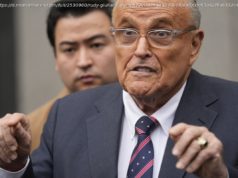Analysts in U. S. and North Korea are sifting Donald Trump and Kim Jong Un’s bombast for clues to their nations’ real intentions.
They hurl insults at each other like sweaty commuters consumed by road rage. The rest of us look on in confusion, unsure whether we are watching meaningless political theater or the realization of some apocalyptic biblical prophecy.
Kim Jong Un calls Donald Trump “ mentally deranged .” Trump responds that Kim is “ obviously a madman .”
Practically everyone suspects that each man has a point. What we know for sure is that both control nuclear arsenals capable of wreaking destruction beyond anyone’s comprehension.
It has been going on all summer, this surreal spectacle of chest-thumping and name-calling. The prospect that Trump or Kim might actually do the things they have been threatening to do on an almost daily basis is so terrifying that the only response most of us can muster is to joke about it.
Dickerson: When lives are at stake, should it be a crime to look the other way? Henderson: Michigan campaign finance rules make suckers of citizens
We understand that the sniper perched in the bell tower, the hacker who steals our financial data or the hurricane poised to pulverize a populous city are threats we have to do something about. In each case, there’s a list of actions those in harm’s way can take to make themselves at least a little less vulnerable.
But it’s unclear what ordinary residents of San Francisco, Tokyo, Seoul or Pyongyang could do to protect themselves if Trump or Kim decided to unleash the fire and fury they are so fond of threatening in their tweets and propaganda videos. So we dismiss their bombast as the stuff of fantasy, like a science-fiction movie in which the protagonist travels across time or discovers that his spouse and children are really holograms.
For more than half a century, almost everyone with any responsibility for the deployment of nuclear weapons has shared the tacit understanding that their use would obliterate any meaningful distinction between belligerents and bystanders.
Distance and technological ingenuity might afford those at the periphery of a major nuclear exchange some temporary advantage. But in the long run, those privileged bystanders might end up envying those who had been instantly incinerated. (If global warming makes you anxious, then Google “ nuclear winter ” and learn what happens when climate change occurs so suddenly that no one has time to argue about it.)
What worries those trying to make sense of North Korea’s provocations is the possibility that Kim and his generals are either skeptical of that consensus or simply indifferent to the possibility that any nuclear exchange would end in North Korea’s annihilation.
Colin Powell at U-M: U. S. should ignore North Koreans when they shoot missiles More: How would a nuclear bomb impact your city? Online tool lets you find out
There is anecdotal evidence to support both of these worrisome hypotheses. Evan Osnos, a veteran foreign correspondent who visited North Korea last month, says he was struck by North Koreans’ widespread conviction that a nuclear showdown with the U. S. would leave their country battered but intact.
“People go out of their way to tell you how comfortable they are with the idea of a nuclear exchange,” Osnos told interviewer Terri Gross in an interview after his return from Pyongyang.
“I had a conversation with a very smart and very alert, knowledgeable America analyst at the Foreign Ministry, a guy named Pak Song Il, whose job it is to analyze the United States, speaks extremely good English. And he said, ‘Look, we understand that a war would be devastating, but we’ve survived devastation twice in our recent history — the Korean War and then the famine of the mid-’90s which killed up to 3 million people.’
“And he said, ‘We would survive again.’
“And he took me down into the subway, which is built a hundred meters underground, twice the depth of the New York subway system, and he said, “This is where we would go in the event of a nuclear strike.’ He showed me the blast doors.”
Bruce Bennett, a Rand Corp. analyst who meets regularly with some of the most senior defectors to escape North Korea, likes to begin briefings with an even scarier anecdote dating to the early 1990s, when Kim Il Sung, grandfather of the current leader and the first in the line of Kims that has ruled the country for decades, asked his most trusted military leaders what he should do if North Korea lost a war with the U. S.
“The North Korean military guys were all smart enough to know that it was a really good time to keep your mouth shut,” Bennett recalls in an overview published in the current edition of the Rand Review. “But his son, Kim Jong Il, the father of the current leader, spoke up and said, ‘If we lose, I will be sure to destroy the Earth. What good is the Earth without North Korea?’ ”
Trump poured gasoline on the paranoia when he asserted that North Korea’s current leader is “on a suicide mission,” suggesting that Kim’s provocations are not only likely to hasten his country’s annihilation but consciously designed to do so. If he’s right, we should probably stop arguing about Obamacare and eat more ice cream.
The generals and analysts advising Trump seem less inclined to take such conspicuous displays of bravado at face value. They are proceeding on the optimistic assumption that Kim and the elite coterie that supports him are as interested in continuing to draw breath as anyone else, but have convinced themselves that the nuclear threat is the surest guarantee of both their country’s physical security and their own political power.
The Trump administration’s grown-ups want to believe they have counterparts in the North Korean intelligence community who are just as quick to discount the U. S. president’s public provocations as they are to dismiss Kim’s. But journalists who’ve visited North Korea say Trump’s tweets leave the Kim regime’s analysts just as puzzled about Washington’s intentions as U. S. strategists are about Pyongyang’s. You needn’t be paranoid to worry that either side’s miscalculation about the other’s motives could prove as dangerous as any overt military act.
When thinking about North Korea drives me to binge-eating, I like to contemplate ways the current crisis could end in something less dramatic than global catastrophe. Here are some of the more plausible ones:
► The U. S. might have the capacity to disrupt Pyongyang’s breakneck schedule of tests and missile flights via cyber-measures or infrastructure sabotage that fall short of a conventional military attack. Such measures could covertly discourage Kim without providing a clear pretext for retaliatory action.






